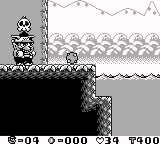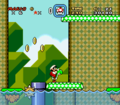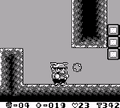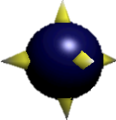Mine
| It has been suggested that proximity mine be merged into this page. (discuss) |
- This article is about the recurring obstacle. For the enemy from Wario Land 4, see Mine (enemy). For the object from Mario Party 6, see Mine (fruit).
| Mine | |||
|---|---|---|---|
 Sprite from Super Mario World | |||
| First appearance | Super Mario World (1990) | ||
| Latest appearance | Mario Party Superstars (2021) | ||
| |||
| |||
Mines (either capitalized[1] or lowercase[2]) are obstacles introduced in Super Mario World. They are Spike Ball-like bombs that are not always shown to be explosive.
History
Super Mario series
Super Mario World
Mines, also referred to as Floating Mines,[3][4] are obstacles in Super Mario World. They appear as spiked balls with a wooden texture and pulsate with spikes. Mines are first encountered in Yoshi's Island 4, where they drift in the water, following the current continuously. Yoshi can step on a mine without taking harm and eat them. A Mine can be defeated from the effects of a Super Star. Mines are later encountered in Sunken Ghost Ship, where many are in free fall, and slowly rise to the surface when landing in the water.
Smaller, multicolored, and more balloon-like versions of Floating Mines attached to poles resembling a Midway Gate were planned to appear in the game.
Super Mario 64 / Super Mario 64 DS
Mines, simply called bombs in Super Mario 64 and also called spiked orbs in the Player's Guide[5] and Super Mario 64 DS, play a vital role in defeating Bowser. In the final arenas of Bowser in the Dark World, Bowser in the Fire Sea, and Bowser in the Sky, where the bombs surround the arena, Mario, Luigi, or Wario has to throw Bowser into one of the bombs to defeat him (three in Bowser in the Sky). If the player jumps into one of the bombs, it will blow up and they will take two wedges of damage.
There was also going to be a smaller, water-based variant, but it was cut out from the final.
Mario's Time Machine
Mines are obstacles in the PC and SNES versions of Mario's Time Machine. They appear while Mario is surfing around only. In the PC version, hitting a mine causes Mario to lose only one mushroom, whereas in the SNES version, hitting a mine causes Mario to lose all of them. In both cases, the mines are not explosive.
Wario Land: Super Mario Land 3
Mines are obstacles in Wario Land: Super Mario Land 3. They can be found on the ground, where they can be picked up, or floating in underwater, where they can interrupt a Body Slam. If interacted with, they proceed to flash and then soon explode, causing damage. The Pecan enemy can also spit mines that sink and automatically explode.
Mario Party series
Mario Party 2
Mines are obstacles in the minigame Deep Sea Salvage in Mario Party 2. They are thrown in an arc among Coins and coin bags by a Hammer Bro on a ship. Like the other objects, they sink directly downward when they land in the water. They explode if they hit a player, stunning them for several seconds. Unlike the other objects, they also explode if they touch the ground on either side of the screen.
Mario Party 3 / Mario Party Superstars
Mines (referred to as bombs) are obstacles in the minigame Cheep Cheep Chase in Mario Party 3 and Mario Party Superstars. The characters can avoid mines by diving under them.
Donkey Kong Country 3
Floating mines are obstacles in the remake of Donkey Kong Country 3. They appear during the "Disarm" mission of Funky's Rentals, where the goal is to take four mines from a Kremling, each one at a time, and have them detonate in a designated space.
DK: Jungle Climber
Mines are obstacles in DK Jungle Climber. They have a similar role as floating spikes from DK: King of Swing. Mines are seen floating in the air and explode upon contact.
Luigi's Mansion 3
Several types of mines appear in Luigi's Mansion 3. In the Boilerworks, mines remain still and flash red when approached, exploding after a seconds. In the ScreamPark minigame Coin Floating, two types of mines appear. There is a normal type resembling a Spike Ball, and a homing type that acts as a bomb. The later moves toward the nearest player, and when close, it flashes red and eventually blows up. In the ScreamPark minigame Floaty Frenzy, mines are periodically dropped onto the field to block certain ways, and explode by themselves after some time passes or if touched by a player. They can pop Luigi's inflatable duck boat and make him drown, losing 20 HP.
Gallery
Screenshot from Super Mario World
Screenshot from Wario Land: Super Mario Land 3
Model from Super Mario 64
Screenshot from Super Mario 64 DS
Sprite from Donkey Kong Country 3
Additional names
Internal names
| Game | File | Name | Meaning
|
|---|---|---|---|
| Super Mario 64 DS | data/enemy/koopa_bomb/ | KIRAI | Bowser Bomb / Mine |
Names in other languages
| Language | Name | Meaning | Notes |
|---|---|---|---|
| Japanese | 機雷[6] (Super Mario World) / Kirai |
Mine | Luigi's Mansion 3 |
| バクダン / Bakudan |
Bomb; shared with bomb and Super Mario 64's flame thrower | Mario Party series | |
| トゲボール[10] Toge Bōru |
Spike Ball; shared with Spike Ball and spike ball | Super Mario World | |
| German | Stachel Floating Mine[?] | Spike Floating Mine | |
| Stachelmine[11] | Spike Mine | ||
| Italian | Mina vagante[12] | Wandering mine | |
| Bomba[13] | Bomb | ||
| Mina[?] | Mine | Mario Party 2 | |
| Spanish | Mina Flotante[?] | Floating Mine |
References
- ^ August 1991. Nintendo Mario Mania Player's Guide. Nintendo of America (American English). Page 58 and 137.
- ^ "Make sure you catch enough mushrooms to enter the time tunnel. And watch out for mines and sharks!" – Hints (1994). Mario's Time Machine.
- ^ August 1991. Nintendo Mario Mania Player's Guide. Nintendo of America (American English). Page 52.
- ^ Tsuboike, Yoshio, et al. (Winter 2002). Nintendo Power Advance Volume 4. Nintendo Power (American English). Page 71.
- ^ Pelland, Scott, and Dan Owsen (1996). Super Mario 64 Player's Guide. Nintendo of America (American English). Page 43 and 125.
- ^ December 10, 1992. 「任天堂公式ガイドブック スーパーマリオワールド」 (Nintendo Kōshiki Guidebook – Super Mario World). Shogakukan (Japanese). ISBN 4-09-104117-5. Page 40.
- ^ November 20, 1994. 「パーフェクト版 マリオキャラクター大事典」 (Perfect Ban Mario Character Daijiten). Shogakukan (Japanese). ISBN 4-09-259067-9. Page 166.
- ^ August 20, 1996. 「任天堂公式ガイドブック スーパーマリオ64」 (Nintendo Kōshiki Guidebook – Super Mario 64). Tokyo: Shogakukan (Japanese). ISBN 4-09-102554-4. Page 35, 63, 94.
- ^ March 1, 2005. 「任天堂公式ガイドブック スーパーマリオ64DS」 (Nintendo Kōshiki Guidebook – Super Mario 64 DS). Shogakukan (Japanese). ISBN 4-09-106212-1. Page 26.
- ^ Sakai, Kazuya (Ambit), et al. (October 19, 2015). 『スーパーマリオブラザーズ百科: 任天堂公式ガイドブック』 (Super Mario Bros. Hyakka: Nintendo Kōshiki Guidebook), スーパーマリオワールド (Sūpā Mario Wārudo). Tokyo: Shogakukan (Japanese). ISBN 978-4-09-106569-8. Page 61.
- ^ Menold, Marcus, Claude M. Moyse, and Andreas G. Kämmerer, editors (1993). Der offizielle Nintendo Spieleberater "Super Mario World". Großostheim: Nintendo of Europe GmbH (German). Page 20.
- ^ November 15, 2018. Super Mario Bros. Enciclopedia, Super Mario World section. Magazzini Salani (Italian). ISBN 889367436X. Page 61.
- ^ Super Mario Bros. Enciclopedia, Super Mario 64 section. Magazzini Salani (Italian). Page 91.






